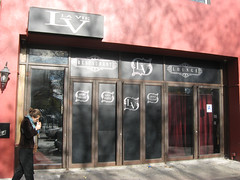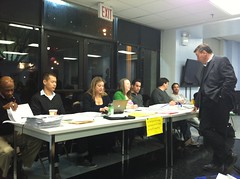One of the East Village’s most complained-about clubs and the scene of a post-Thanksgiving stabbing is up for a liquor license renewal; but even with a new partner promising to make changes, neighbors aren’t hearing it.
About a month ago, Joseph Shienouda, 32, bought a 50 percent stake in La Vie, a club on First Street that racked up the 12th highest number of noise complaints within the boundaries of Community Board 3. Some believe the new part-owner has continued to operate the venue – listed as a bar and restaurant on its most recent liquor license questionnaire – as an unlicensed cabaret, with live D.J.s and late-night dance parties.
At last night’s meeting of C.B. 3’s S.L.A. Licensing committee, Jason Weisfuse, who lives next-door to the club at 62 East First Street, said decibel levels had not decreased since Mr. Shienouda came on board. “I hear their music practically every single night – earth-shaking bass music weeknights until 4 a.m.” he said. “We’ve communicated with them countless times. After a year and a half, we’ve stopped reaching out to them.”
But the new partner, who said he had previously managed a club in New Jersey for five years, claimed that he had started making changes.
“I already hired new security outside; I have employees cleaning the sidewalk from First Avenue, and controlling people on the way outside,” said Mr. Shienouda. “For now I have three security guards for every single night.”
In addition to these improvements, Mr. Sheinouda invited his neighbors to La Vie earlier this month to air their complaints.
According to Robert Graf, president of the First Street Block Association, about 20 people showed up. “Joseph said in summary that the bad old days are gone, and we should develop a trusting relationship,” he said. “But I reviewed their application form and noted that it called for D.J.s, music and promotional events. All conditions that created problems in first place.”
“If you’re serious about gaining the trust of the block, I suggest you resubmit your application and show that you’re going to get rid of D.J.s, live music and promotional events,” said Mr. Graf. “If you do something like that, you can begin to build trust.”
According to State Liquor Authority policy, liquor-serving businesses must appear before their local community board if ownership changes by at least 80 percent. This was not the case for La Vie, since Mr. Shienouda purchased only half of the business; but due the club’s less-than-glowing track record, the State Liquor Authority sought comment from the Community Board anyway.
Ultimately, the committee opted not to endorse the new owner and to stand by its original recommendation, in January of 2011, that the S.L.A. not renew La Vie’s liquor license.
David McWater, a member of the committee, cited the club’s business plan in 2003: “They would never have gotten this license unless they said they were going to be a restaurant bakery. And it’s clear this guy is going to operate as a restaurant-nightclub.”





